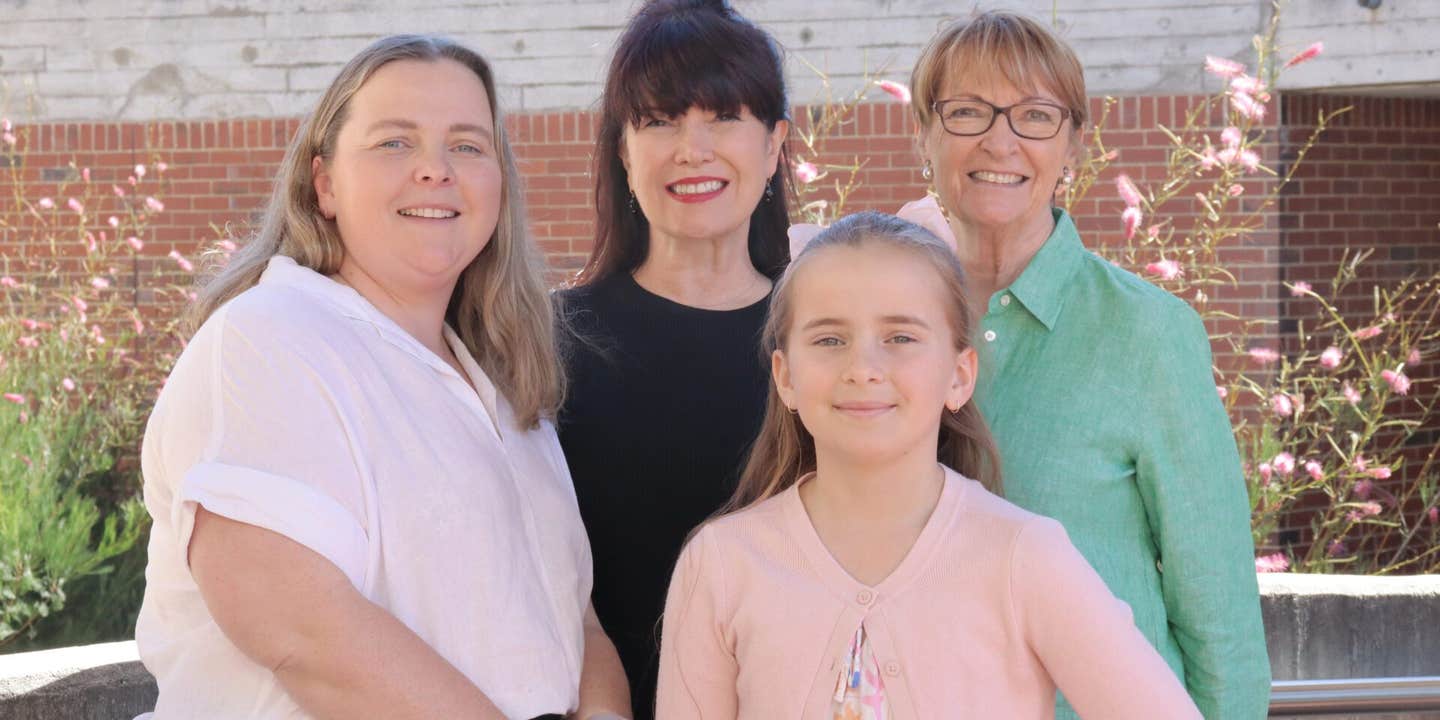Breakthrough study reveals 57 genetic causes of stuttering – offering new hope for millions
A major genetic study identifies 57 genes linked to stuttering, offering hope for earlier diagnosis and better treatment options.

(Left to right): Simone Hewitt, Clinical Educator Kathy Viljoen, Harriet Hewitt and Curtin Stuttering Treatment Clinic Founder Associate Professor Janet Beilby. (CREDIT: Curtin School of Allied Health)
Stuttering is more than a speech issue; it's a life-altering condition for millions globally. If someone you know struggles with stuttering, the frustration and emotional toll can be profound. Until recently, the genetic causes behind this common yet misunderstood disorder remained largely unknown.
Now, groundbreaking new research published in Nature Genetics offers fresh insights, bringing hope to millions who stutter and their families.
Understanding the Hidden Genetics of Stuttering
Stuttering affects more than 400 million people worldwide, roughly 5 to 8 percent of the population. In Australia, prevalence rises as high as 11 percent. It usually begins in children between ages two and five, featuring repetitions, prolongations of sounds, and involuntary pauses known as blocks. While about 80 percent of children recover naturally or through therapy, many carry stuttering into adulthood, facing lifelong consequences.
Despite years of study, stuttering had remained elusive genetically. Previous attempts found only a few candidate genes, leaving most hereditary factors unclear. But now, thanks to the largest study ever conducted—analyzing saliva samples from over one million participants worldwide—researchers identified a staggering 57 distinct genetic markers associated with stuttering.
Led by scientists at Wayne State University, Curtin Stuttering Treatment Clinic, and Vanderbilt University Medical Centre, the study analyzed genetic data from nearly 100,000 people who stutter, compared against more than one million who don't. This extensive approach allowed researchers to pinpoint genetic factors unique to different genders and ancestry groups.
Associate Professor Janet Beilby from Curtin School of Allied Health, who co-authored the study, described the findings as “groundbreaking” for millions affected by stuttering.
“This finding is life-changing for all those children who stutter,” Beilby explained. “Stuttering is more than just a stutter—most children with a speech or language disorder will be bullied at school, and adults who stutter may face challenges in the workplace.”
Related Stories
- Researchers discover why some people stutter
- 21-language neural text-to-speech technology now works on smartphones
- Scientists develop new technology to give speech-disabled patients a voice
Genetic Connections to Autism and Rhythm
Beyond identifying specific genetic markers, the study revealed surprising links between stuttering and other neurological traits. Genetic correlations were found connecting stuttering with autism, depression, and even difficulties with musical rhythm. These discoveries strongly suggest that stuttering arises from underlying neurological factors, rather than merely speech-related ones.
Dr. Shelly Jo Kraft from Wayne State University emphasized how these connections could reshape understanding and treatment.
“Our results help explain why people who stutter may struggle in other areas, such as emotional regulation and rhythm processing,” said Kraft. “It underscores that stuttering is deeply rooted in our biology, affecting more than just speech.”
These connections provide new opportunities to understand stuttering not as an isolated condition but as part of a broader spectrum of neurological diversity. This broader approach could transform future treatment strategies.
Early Intervention through Genetic Testing
One of the most promising applications of this genetic discovery is predicting stuttering risk within families. Researchers at Curtin University collected saliva samples from multiple generations of families, including young children like 10-year-old Harriet Hewitt, a fourth-generation family member who stutters. Her family’s involvement illustrates how genetic testing could change lives.
“Early intervention makes all the difference,” Harriet’s mother, Simone Hewitt, said. “When Harriet first started stuttering, she would just go quiet. With treatment, she’s found her beautiful voice. This research will be a game-changer for my grandchildren who won’t have to wait until stuttering presents to get the help they need.”
In the future, a simple DNA test might predict whether a child will stutter, allowing families to access intervention earlier. This approach could prevent much of the emotional pain and social struggles associated with stuttering.
Associate Professor Beilby reinforced the significance of this possibility.
“If we can identify who in a particular family will develop a stutter, we can intervene earlier to prevent potentially lifelong consequences,” she said.
Moving Toward Precision Care
Although researchers uncovered many genetic signals linked to stuttering, understanding precisely how these genes function remains an ongoing effort. Further research will focus on turning genetic discoveries into practical treatments.
Currently, no cure exists for stuttering. Existing interventions include speech therapy, cognitive behavioral approaches, and technology-assisted feedback. However, these methods mainly address symptoms rather than underlying biological causes.
This study opens doors to precision medicine tailored to a person’s genetic profile. Therapies targeting specific genetic factors or neurological processes could emerge, providing hope for more effective management or even prevention.
The Curtin Stuttering Treatment Clinic, celebrating its 40th anniversary, continues to pioneer research and treatment. This study’s success highlights decades of dedication and collaboration, offering real hope to millions worldwide.
“Knowing that stuttering has clear genetic roots changes how we approach treatment,” said Beilby. “We're closer to a future where people who stutter can get precise, effective help before the condition significantly impacts their lives.”
For now, families like the Hewitts see promise in these genetic insights, hoping future generations may overcome stuttering before it ever begins.
Note: The article above provided above by The Brighter Side of News.
Like these kind of feel good stories? Get The Brighter Side of News' newsletter.



